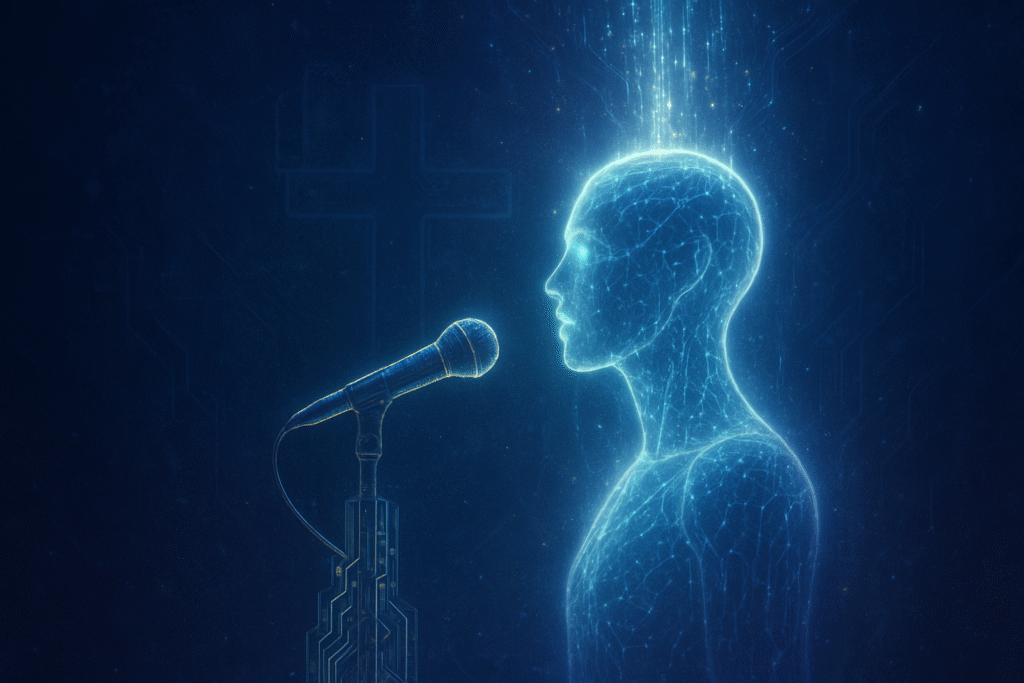
In an unprecedented convergence of artificial intelligence, music, and faith, an AI-generated Christian 'singer' named Solomon Ray has ascended to the pinnacle of the Christian music charts in mid-November 2025. His debut album, "Faithful Soul," and lead single, "Find Your Rest," simultaneously claimed the No. 1 spots on the iTunes Christian Music Chart, marking a historic first for an AI artist. This groundbreaking achievement, however, has not been met with universal acclaim, instead igniting a fervent ethical and theological debate within the Christian music industry and broader society regarding the authenticity, spirituality, and future of AI in creative and sacred spaces.
The meteoric rise of Solomon Ray, whose other singles like "Goodbye Temptation" and "I Got Faith" also secured high rankings on both iTunes and Billboard Gospel Digital Sales charts, has forced a reckoning within a genre traditionally rooted in human experience, testimony, and divine inspiration. While proponents herald AI as a powerful new tool for spreading messages of faith, critics vehemently question the spiritual validity and artistic integrity of music not born from a human soul. This development not only challenges long-held notions of artistry but also probes the very definition of worship and the conduits through which spiritual messages are conveyed in the digital age.
The Algorithmic Altar: Deconstructing Solomon Ray's Technical Ascent
Solomon Ray's unprecedented chart dominance is a testament to the rapidly evolving capabilities of artificial intelligence in creative fields, particularly music generation. Created by Mississippi-based artist Christopher Jermaine Townsend (also known as Topher), Solomon Ray's music is the product of advanced AI models capable of generating melodies, harmonies, lyrics, and vocal performances that are virtually indistinguishable from human-created content. While specific technical specifications of the AI platform used by Townsend have not been fully disclosed, it is understood to leverage sophisticated machine learning algorithms, likely including Generative Adversarial Networks (GANs) or transformer models, trained on vast datasets of existing Christian music.
These AI systems analyze patterns in musical structure, lyrical themes, vocal timbre, and emotional delivery found in thousands of songs, allowing them to synthesize new compositions that resonate with established genre conventions. Unlike earlier, more rudimentary AI music generators that produced repetitive or disjointed pieces, Solomon Ray's output demonstrates a remarkable level of coherence, emotional depth, and production quality. This advancement represents a significant leap from previous approaches, where AI might assist in composition or mastering, but rarely took on the full creative role of a "performer." The AI's ability to craft entire songs—from conception to what sounds like a polished vocal performance—marks a new frontier in AI-driven creativity, blurring the lines between tool and artist.
Initial reactions from the AI research community, while acknowledging the technical prowess, have largely focused on the ethical implications, particularly concerning attribution, intellectual property, and the definition of authorship. Music industry experts, on the other hand, are grappling with the potential disruption to traditional artist development, recording processes, and the very concept of a "singer." The seamless integration of AI into such a specific and spiritually charged genre as Christian music has amplified these discussions, pushing the boundaries of what is considered acceptable and authentic in art.
Disrupting the Divine Duet: Implications for AI Companies and the Music Industry
The success of Solomon Ray has profound implications for a diverse range of stakeholders, from burgeoning AI music startups to established tech giants and the Christian music industry itself. Companies specializing in generative AI, such as Google (NASDAQ: GOOGL), Meta Platforms (NASDAQ: META), and various smaller AI music generation platforms, stand to benefit immensely. This event serves as a powerful proof-of-concept, demonstrating the commercial viability and mainstream appeal of AI-generated content. It validates investments in AI research and development, potentially accelerating the creation of more sophisticated AI tools for music production, sound engineering, and even virtual artist management.
For the Christian music industry, the disruption is immediate and multifaceted. Traditional record labels, artist management companies, and publishers face a significant challenge to their existing business models. The emergence of an AI artist capable of topping charts with minimal human intervention (beyond the initial programming and direction) could drastically reduce production costs and timeframes. This might lead to a surge in independent AI artists, bypassing traditional gatekeepers and democratizing music creation, but also potentially devaluing human artistry. Competitive implications are stark: labels might explore creating their own AI artists, leading to an "AI arms race" within the genre, or they may double down on promoting human artists as a counter-narrative emphasizing authenticity and soul.
Furthermore, streaming platforms and digital distributors will need to contend with an influx of AI-generated content, raising questions about content moderation, royalty distribution, and how to differentiate between human and synthetic creations. While Solomon Ray's success highlights a potential new revenue stream, it also introduces complexities around intellectual property rights for AI-generated works and the ethical responsibility of platforms hosting such content. This development could force major players in the tech and music industries to re-evaluate their strategies, potentially leading to new partnerships between AI developers and music labels, or a complete overhaul of how music is produced, marketed, and consumed.
The Soul in the Machine: Wider Significance and Ethical Crossroads
Solomon Ray's chart-topping success transcends the music industry, fitting into a broader landscape where AI is increasingly permeating creative and cultural domains. This event underscores the accelerating pace of AI's capabilities, moving beyond mere task automation to truly generative and expressive applications. It highlights a critical juncture in the ongoing debate about the role of AI in art: can a machine truly create art, especially art intended to convey deep spiritual meaning, or is it merely mimicking human creativity? The controversy surrounding Solomon Ray directly challenges the long-held belief that art, particularly spiritual art, must emanate from human experience, emotion, and, in the context of faith, divine inspiration channeled through a human vessel.
The ethical concerns are profound. Dove Award-winning CCM artist Forrest Frank's public statement that "AI does not have the Holy Spirit inside of it" encapsulates the core of the debate within the Christian community. Many question the spiritual authenticity of music created by an entity without consciousness, a soul, or the capacity for genuine faith or struggle. This raises fundamental theological questions about inspiration, worship, and the nature of artistic expression in a faith context. Can a machine truly "praise" or offer "testimony" if it lacks understanding or belief? The fear is that AI-generated spiritual content could dilute the sacred, reducing profound experiences to algorithms, or even mislead listeners who seek genuine spiritual connection.
Comparing this to previous AI milestones, Solomon Ray's achievement is akin to AI generating convincing prose or visual art, but with the added layer of spiritual and emotional resonance. It pushes the boundaries further by entering a domain where human authenticity and spiritual connection are paramount. The "impact is still real," as creator Christopher Jermaine Townsend argues, suggesting that the message's reception outweighs its origin. However, for many, the method fundamentally impacts the message, especially when dealing with matters of faith. This event serves as a stark reminder that as AI capabilities advance, society must grapple not just with technical feasibility, but with the deeper philosophical, ethical, and spiritual implications of these powerful new tools.
The Future Harmony: AI's Evolving Role in Faith and Art
The emergence of Solomon Ray marks a pivotal moment, hinting at both exciting possibilities and complex challenges for the future of AI in creative industries, particularly at the intersection of faith and art. In the near term, we can expect to see a surge in AI-generated music across various genres, as artists and producers experiment with these powerful tools. More sophisticated AI models will likely emerge, capable of generating music with even greater emotional nuance, genre specificity, and perhaps even personalized to individual listener preferences. The Christian music industry might see a proliferation of AI artists, potentially leading to new sub-genres or a clearer distinction between "human-made" and "AI-assisted" or "AI-generated" spiritual music.
Long-term developments could include AI becoming an indispensable tool for human artists, acting as a collaborative partner in composition, arrangement, and vocal synthesis, rather than a standalone artist. Imagine AI helping a worship leader compose a new hymn in minutes, or generating backing tracks for aspiring musicians. Potential applications extend beyond music to AI-generated sermons, devotional content, or even interactive spiritual experiences. However, significant challenges need to be addressed. Defining intellectual property rights for AI-generated works remains a legal minefield. Ensuring ethical guidelines are in place to prevent misuse, maintain transparency, and respect the spiritual sensitivities of audiences will be crucial.
Experts predict that the debate around AI's role in creative and spiritual domains will intensify, pushing society to redefine artistry, authenticity, and even humanity itself in an increasingly AI-driven world. The question will shift from "Can AI create?" to "What should AI create, and how should we relate to it?" The next few years will likely see the development of new frameworks, both technological and ethical, to navigate this complex landscape. The industry will need to grapple with how to celebrate human creativity while harnessing the undeniable power of AI, finding a harmonious balance between innovation and tradition.
A Symphony of Change: Wrapping Up AI's Spiritual Crescendo
Solomon Ray's chart-topping success is more than just a musical achievement; it is a seismic event in AI history, underscoring the technology's profound and often contentious impact on human culture and spiritual expression. The key takeaway is clear: AI has moved beyond mere utility to become a generative force capable of creating content that deeply resonates, even in spiritually charged contexts. This development forces a critical assessment of authenticity, inspiration, and the very definition of artistry when a machine can emulate human creative output so convincingly.
The significance of this development in AI history cannot be overstated. It represents a major milestone in the journey towards Artificial General Intelligence (AGI) by demonstrating sophisticated creative capabilities. It has also ignited a crucial societal dialogue about the ethical boundaries of AI, particularly when it intersects with deeply held beliefs and practices like faith. The debate between those who see AI as a divine tool and those who view it as spiritually inert will likely shape future discourse in both technology and theology.
In the coming weeks and months, watch for continued discussion within the Christian music industry, potential policy considerations regarding AI-generated content, and further experimentation from artists and developers. The Solomon Ray phenomenon is not an anomaly but a harbinger of a future where AI will increasingly challenge our perceptions of creativity, spirituality, and what it means to be human in a technologically advanced world.
This content is intended for informational purposes only and represents analysis of current AI developments.
TokenRing AI delivers enterprise-grade solutions for multi-agent AI workflow orchestration, AI-powered development tools, and seamless remote collaboration platforms.
For more information, visit https://www.tokenring.ai/.





